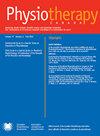Entry-To-Practice Competency Expectations for Health Justice in Physiotherapy Curricula: A Scoping Review
IF 0.8
4区 医学
Q4 REHABILITATION
引用次数: 0
Abstract
Canadian physiotherapists are expected to demonstrate essential competencies upon entry-to-practice including health justice competencies. However, as an emerging topic among Canadian physiotherapy programs, physiotherapy curricula may lack explicit content to develop skills related to health justice. This scoping review examined existing entry-level physiotherapy competencies related to health justice in Canada and countries other than Canada, the existing entry-level competencies for physiotherapy related to health justice in countries other than Canada; and evaluated how entry-level competencies related to health justice in Canadian physiotherapy practice compared to those of other countries. Four databases (MEDLINE, Emcare, Embase, and CINHL) and the grey literature were searched. Four thousand three hundred seventy-seven relevant abstracts and 71 grey literature sources were identified respectively. One hundred seven sources underwent full text review with 12 database articles and 13 grey literature sources selected for data extraction. None of the included articles specifically articulated one or more competencies for health justice; instead competencies in content areas relevant to health justice were identified. During the data extraction phase four themes were identified: (1) Lack of specificity, clarity, and consistency which was further separated into two subthemes (a) lack of consistency and clarity of definitions and concepts (b) lack of an assessment tool; (2) Author identification; (3) Curriculum development; (4) Experiential learning. Limitations include restricting the search to English language only, and grey literature limited to specific PDFs and websites. The data collected in this scoping review demonstrates gaps in the integration of health justice in Canadian and international entry-level physiotherapy curricula.物理治疗课程中对健康正义的入职能力要求:范围审查
加拿大物理治疗师在入职时应具备基本能力,包括健康公正能力。然而,作为加拿大物理治疗课程中的一个新兴课题,物理治疗课程可能缺乏明确的内容来培养与健康正义相关的技能。本次范围界定审查研究了加拿大和加拿大以外其他国家现有的与健康公正相关的物理治疗入门能力、加拿大以外其他国家现有的与健康公正相关的物理治疗入门能力,并评估了加拿大物理治疗实践中与健康公正相关的入门能力与其他国家的入门能力的比较情况。对四个数据库(MEDLINE、Emcare、Embase 和 CINHL)和灰色文献进行了检索。分别找到了四千三百七十七篇相关摘要和七十一篇灰色文献。对其中的 17 篇资料进行了全文检索,并选择了 12 篇数据库文章和 13 篇灰色文献资料进行数据提取。所收录的文章中没有一篇具体阐述了一种或多种卫生司法能力,而是确定了与卫生司法相关的内容领域的能力。在数据提取阶段,确定了四个主题:(1) 缺乏具体性、清晰性和一致性,进一步分为两个次主题(a)定义和概念缺乏一致性和清晰性(b)缺乏评估工具;(2) 作者鉴定;(3) 课程开发;(4) 体验式学习。局限性包括搜索仅限于英语,灰色文献仅限于特定的 PDF 文件和网站。本次范围审查收集的数据表明,加拿大和国际入门级物理治疗课程在整合健康正义方面存在差距。
本文章由计算机程序翻译,如有差异,请以英文原文为准。
求助全文
约1分钟内获得全文
求助全文
来源期刊

Physiotherapy Canada
REHABILITATION-
CiteScore
1.90
自引率
20.00%
发文量
93
审稿时长
>12 weeks
期刊介绍:
Physiotherapy Canada is the official, scholarly, refereed journal of the Canadian Physiotherapy Association (CPA), giving direction to excellence in clinical science and reasoning, knowledge translation, therapeutic skills and patient-centred care.
Founded in 1923, Physiotherapy Canada meets the diverse needs of national and international readers and serves as a key repository of inquiries, evidence and advances in the practice of physiotherapy.
Physiotherapy Canada publishes the results of qualitative and quantitative research including systematic reviews, meta analyses, meta syntheses, public/health policy research, clinical practice guidelines, and case reports. Key messages, clinical commentaries, brief reports and book reviews support knowledge translation to clinical practice.
In addition to delivering authoritative, original scientific articles and reports of significant clinical studies, Physiotherapy Canada’s editorials and abstracts are presented in both English and French, expanding the journal’s reach nationally and internationally. Key messages form an integral part of each research article, providing a succinct summary for readers of all levels. This approach also allows readers to quickly get a feel for ‘what is already known’ and ‘what this study adds to’ the subject.
Clinician’s commentaries for key articles assist in bridging research and practice by discussing the article’s impact at the clinical level. The journal also features special themed series which bring readers up to date research supporting evidence-informed practice.
The Canadian Physiotherapy Association (CPA) is the national professional association representing almost 15,000 members distributed throughout all provinces and territories. CPA’s mission is to provide leadership and direction to the physiotherapy profession, foster excellence in practice, education and research, and promote high standards of health in Canada.
 求助内容:
求助内容: 应助结果提醒方式:
应助结果提醒方式:


